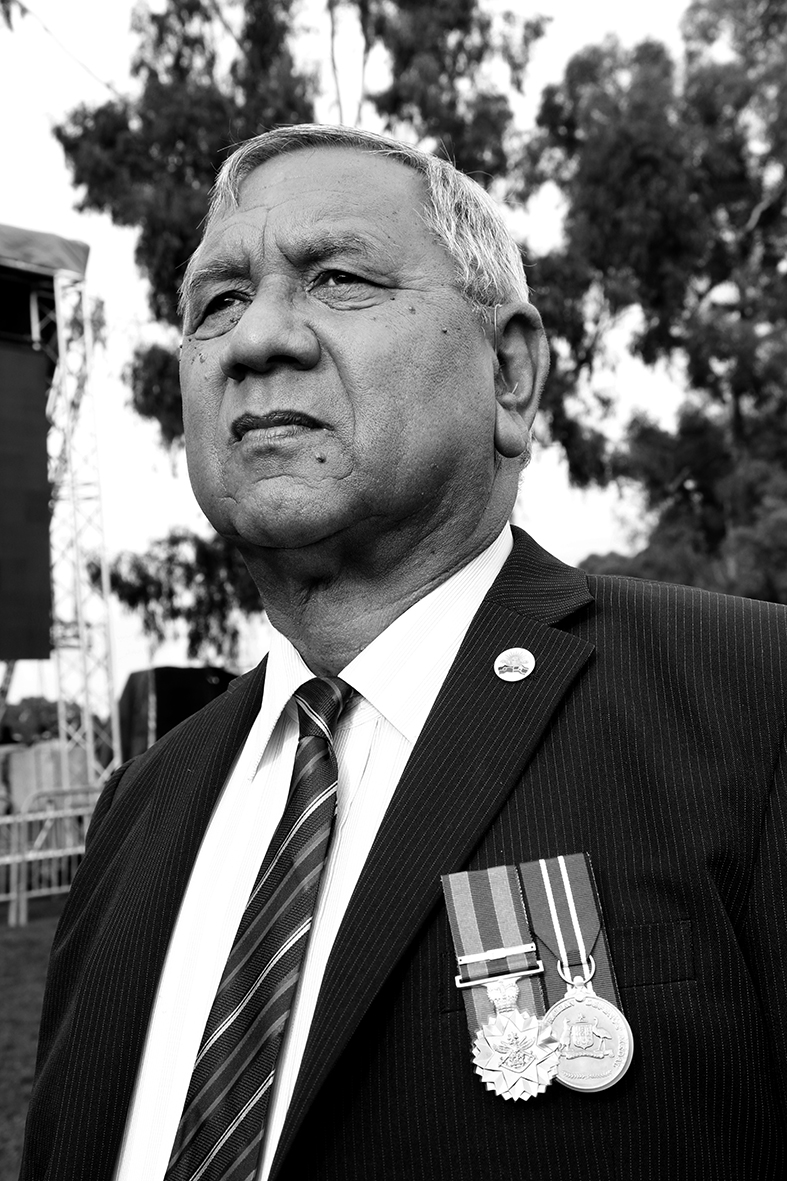Charles Mundine
Wehlubal People of the Bundjalung Nation
Sergeant
Royal Australian Electrical and Mechanical Engineers
Elder of the School of Military Engineering
Elder of the School of Military Police
Australian Army
Medals
Defence Force Service Medal with 1st clasp
Australian Defence Medal
Aboriginal People and the Defence Department have the same responsibilities, ‘Caring and Defending Country’ – which is looking after the lands, the waters, the seas, and making sure all the environment is well looked after – and especially the people. As an Aboriginal person, that’s what I was taught I had to do before I joined, and something I have done my whole life. The public thinks it’s just about killing people, it’s not really. I have spent my life serving my community, including 21 years in the Australian Army as a Radio Mechanic in the Royal Australian Electrical and Mechanical Engineers from 1972-1993. When I left the Army, I went into business with a couple of ex-army mates doing electronics maintenance of military electronic ranges. The business outgrew us and got too big for just the three of us running it – you had to be a multinational company really to do that kind of work.
I decided to contribute to communities as a sessional specialist in corrective services. I taught not just Aboriginal and Torres Strait Island people but everyone about sexual health, drug and alcohol and general welfare. I got tired of seeing the same faces coming backwards and forwards and left – because there had to be a better way. I went and worked at Linkup, an organisation that helps people from the Stolen Generation to find their families and communities. But it is also about helping communities reconnect with their young ones that were taken away. That’s a very emotional job, and eventually, it gets to everyone who works there. It is devastating for those who pass away without ever finding their family. So, I went across to Aboriginal Health for a while, again as a sexual health worker.
When I was thinking of retiring a friend said, ‘I’m starting up a program working with Aboriginal and Torres Strait Islander high school students. It’s called the AFL Indigenous Academy. Do you want to give me a hand to start it up? It will be a couple of months’ work.’ Eighteen years later, I’m still there. It’s really rewarding watching, mainly high school students, grow and then move on to a better life that their families wouldn’t even have dreamt that they could achieve. Some became academics, doctors, teachers and tradespeople. We’ve got a couple of carpenters and auto mechanics, and even a young bloke who wasn’t going to do very well at school went and did a fencing course, and now he runs a very successful fencing company and employs over 12 people. So it’s great seeing them achieve things. When they come back to thank us, I am always surprised when they’ve got children, and then I realise how long I have been doing this.
You see when students almost make it, they get devastated, but I tell them, ‘You can always retrain, move to another field, or just have a break and come back and continue on later.’ Having that conversation, the greatest thing is showing they have the chance to have the best life possible. It’s very gratifying to see that they do. Of course, I’ve had a couple of students who ended up in gaol for one reason or another, but that is how it goes sometimes.
Sport can also support young people. I know this from when I was a Rugby Union referee, and it’s why I also work at the AFL Indigenous Academy for students from years 7-12. When I’m talking with Aboriginal students, all their non-Aboriginal friends stand around the edge and listen. They want to talk to me about taking part in the programs, too. A number of these students go on to successful careers beyond school. I am one of the Elders with the Aurora Foundation’s Education and RISE programs. An organisation that changes conversations around Indigenous high school education from one of deficit to one with higher expectations that explores ways to achieve a higher education and career opportunities in academia. We find them scholarships, and they can actually study anywhere in the world. My role as Elder is to spend time with Indigenous high school students, passing on my knowledge and learnings and facilitating activities that bring together culture and education.
The work at New South Wales district courts with people on the WALAMA List, WALAMA in Dharug language, means ‘come back’ or return, is a holistic approach to working with eligible Aboriginal and Torres Strait Islander offenders. It is based around coming back to identity, community, culture, and a healthy, crime-free life. It is a new way for the courts to operate with serious and long-term offenders. The program is about changing their behaviour. If they’re a drug addict or an alcoholic, we recommend/advise rehab programs. If they are a violent offender, we recommend they do behavioural courses such as anti-violence, anti-domestic violence and parenting courses etc. We recommend services that can provide the support they need. We have had about 26 people who have not gone back to gaol, so it’s working quite well. To continue to make this program successful, the justice system needs Aboriginal community members to support young offenders going through the interview process and make sure that they understand everything that’s happening.
What drives me in the work I do today is the good outcomes we see from young people achieving when given the opportunity. This all comes from my background in the military, together with what my grandparents and parents taught me. We have a responsibility to the community, because the community looks after us. Everyone has a responsibility. You’ve got to choose which way you go and how you use it. The only thing restricting anyone from achieving anything is themselves.
